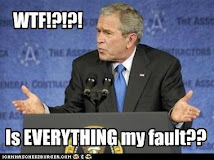Several small studies have been completed by The University of Waterloo, Ontario and Duke University, the finding show that more ignorant a person is on a complicated issue the more likely they are to allow the government handle it. I would think that Global Warming would be one of these issues, as trying to read some of the scientific data on it is a mind numbing experience.
But, I have to wonder would the results be similar if they studied less complicated issues? We live in a society where government dependency is becoming more and more commonplace. One has to look no further on the record numbers on food stamps at the moment. While there is an economic reason why so many have found themselves in a position to take help from the government at this point in time in our history, can we say that this is not going to lead to more government dependency as time goes on? I don't think that will be clear for quite some time, but it should be a growing concern in this country.
We are seeing Europe going through austerity measures and in Greece the people are not reacting well to having to retire later and getting fewer benefits. Isn't this sort of the same type of thing? Is the average person living in Greece looking at the numbers and looking at the not so healthy world economy? One would think that if they were paying even the least little bit of attention they would realize that the changes are quite literally vital to their country's economic well-being.
Uncertainty brings anxiety, Shepherd and Kay explain, and one way to deal with that anxiety is to “simply outsource personal responsibility to supposed qualified others.”Do we really have "qualified others" in our government at present? I am sure that some are, but just take a look at the failure of the "Super Committee", a committee that was formed that never had a chance of anything but failure. These are the people we should be looking at as qualified?
But here is the money item:
“Being actively critical of something one is dependent on is thought to be psychologically uncomfortable, and therefore avoided in favor of increased perceptions of legitimacy, trust, and desirability. System justification theory posits that people are motivated to justify and legitimize the status quo and the system in which one lives.”Once you have turned over the control to the government you are basically giving them unlimited power to do whatever they want to your life. You become complacent and no longer feel the need or the desire to pay close attention to what is going on around you. You become almost slave like to the whims of people who you have never met, who don't understand your real needs or desires, nor do they care to know. You have given them unbridled power to behave as they so choose. They then become addicted to the power and will say and do anything to hold onto that power.
I have been saying for years that we have no one to blame but ourselves for the mess that we are currently facing. We have the government that we deserve. We expected it work just fine on auto-pilot. Clearly, with trillions of dollars worth of debt, public schools that are failing our children, and public officials that are out of control, we were wrong.
The one bright spot of the research was the following on the Tea Party:
“Generally I think of those movements as representing instances where people are not following our model, possibly because these are people who feel a) a sense of personal control/efficacy, and b) feel like their behavior can create change. This sense of personal control and ability to create change may make people feel less dependent on the government, or change how they respond to perceived dependence. Either way, it means that the individual may be less inclined to truth authority and avoid the issues.”It is clear that we must become more involved in our government and the issues facing this country or we face a life of dependency and outsourcing any sort of control over our own lives.























